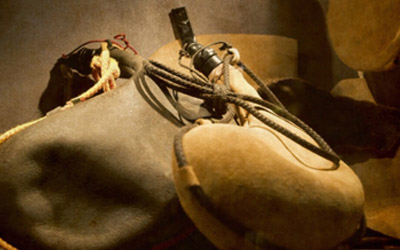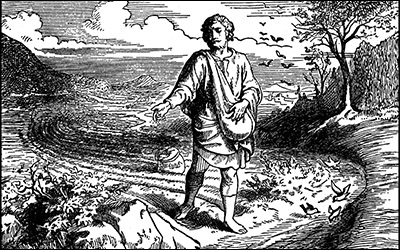Parable of the Net
This parable is about the ushering in of a new era: the new covenant between God and Man. (Luke 16:1-8).
(Bấm vào đây để đọc tiếng Việt)
The Parable
47“Again, the kingdom of heaven is like a net that was cast into the sea that caught all kinds of fish. 48When it was full, they pulled it ashore, sat down, and put the good fish into containers and threw the bad away. 49It will be this way at the end of the age. Angels will come and separate the evil from the righteous 50and throw them into the fiery furnace, where there will be weeping and gnashing of teeth. 51“Have you understood all these things?” They replied, “Yes.” 52Then he said to them, “Therefore every expert in the law who has been trained for the kingdom of heaven is like the owner of a house who brings out of his treasure what is new and old.” 53Now when Jesus finished these parables, he moved on from there. (Matthew 13:47-53)
 In this parable Jesus uses two examples with plain meaning and one with hidden meaning. In the first two examples we noticed a common point between them that there is a choice between two opposites, one is kept while the other is thrown away. In the first example, the good fish are kept in containers while the bad ones are thrown back into the sea. In the second example, the righteous is kept while the evil is thrown into the fiery furnace. Now what about the third example which I believe has a hidden meaning? If there is a choice to keep one and toss the other in the first two examples, then shouldn't there be a choice in the third example as well? I think this makes great sense. Therefore, if we continue with the flow of meaning in this parable, we must deduce that the new is kept while the old must be set aside.
In this parable Jesus uses two examples with plain meaning and one with hidden meaning. In the first two examples we noticed a common point between them that there is a choice between two opposites, one is kept while the other is thrown away. In the first example, the good fish are kept in containers while the bad ones are thrown back into the sea. In the second example, the righteous is kept while the evil is thrown into the fiery furnace. Now what about the third example which I believe has a hidden meaning? If there is a choice to keep one and toss the other in the first two examples, then shouldn't there be a choice in the third example as well? I think this makes great sense. Therefore, if we continue with the flow of meaning in this parable, we must deduce that the new is kept while the old must be set aside.
There are many Scriptures about new and old things. Let us review some of them so we may understand what Jesus is trying to teach us in this parable.
New wine requires new wineskin
And no one pours new wine into old wineskins; otherwise, the wine will burst the skins, and both the wine and the skins will be destroyed. Instead new wine is poured into new wineskins.” (Mark 2:22)
New wine represents Jesus, and the gospel of salvation, which will quench the thirst of those who hunger and thirst for righteousness. New wineskin represents the new man created in Christ by God’s promise and the power of the Creator of the universe. The new wineskin is not the old man deep in sin and trespasses. Therefore the new wine, or the gospel, must be put into the new wineskin. But this is a mystery not commonly understood by Christians, so they tend to do the exact opposite. They try to put the new wine of the gospel into the old wineskin, to use it to improve upon the old man which is under sin’s dominion for the rest of his life. This is the principle cause for the lack of the joy of salvation in the lives of many. This is the reason for “both the wine and the skins will be destroyed” in verse 22 above. Paul wrote the entire book of Romans to explain this truth which is buried deep in this parable of Jesus that his contemporary did not understand, but it’s not only them, many among us also did not get its true meaning.
New creation in Christ
So then, if anyone is in Christ, he is a new creation; what is old has passed away—look, what is new has come! (2 Corinthians 5:17)
The new man, according to this passage, is not the old man who is improved through self efforts according to some religious principles. But this man is a “new creation,” a wholly new creature. He is created in the same way God created the world from nothing. There are those who compare the newness of this man to a person who daily stand in front of a mirror applying facial skin preservation methods using store bought cosmetics. But this is a grossly errorneous view of faith. God has never, and will never, try to improve the old wineskin–old man–, or attach the new wineskin–new creation– to the old one, or pour his new wine into the old wineskin. Now if the new wineskin–the wholly new creation– that God gives is already perfect, who dares to improve upon it? How do you renew it if it’s already new?
Isaiah’s prophesy of the new path
“Look, I am about to do something new. Now it begins to happen! Do you not recognize it? Yes, I will make a road in the desert and paths in the wilderness.” (Isaiah 43:19)
This new path in the wilderness is the birth of our Redeemer, a living stream of eternal life that flows through parched land. This word “new” signifies an amazing appearance of the greatest of news never having been heard before which gives man great hope. Isaiah spoke of this great news a bit earlier in Isaiah 42:9:
“Behold, the former things are come to pass, and new things do I declare: before they spring forth I tell you of them. (KJV)”
A new and living way through the body of Christ
Paul wrote of a new thing in Hebrews 10:20 which had become a well memorized verse by many Christians:
“By the fresh and living way that he inaugurated for us through the curtain, that is, through his flesh,”
A new covenant
Let’s recall verses 52 and 53 at the end of the Parable of The Net:
52Then he said to them, “Therefore every expert in the law who has been trained for the kingdom of heaven is like the owner of a house who brings out of his treasure what is new and old.” 53Now when Jesus finished these parables, he moved on from there.
The Scripture passages listed above, which all speak of new things concerning salvation, may help us understand Jesus’ mind when he used this parable to speak of things old and new. Though He did not say what the owner of the house was going to do with old and new things he brought out, we may be able to arrive at the conclusion that this owner will keep the new things and discard the old. It seems to me Jesus didn’t want us to be like little children who want everything presented to them like black and white, but like mature people who carefully consider many things He said so we may understand Him. He spoke of the owner of the house who brought out old and new things, then He left it to us to understand what He meant. I love the way Jesus teaches us through parables. In this teaching style, those who truly hunger and thirst for righteousness will find it, while those who want to blindly and simplistically apply what He said will not find it, and will arrive at a wrong conclusion.
The scribes of Jesus’ time, or the Pharisees who were well versed in Mosaic law, as we have read in the gospel of Matthew, Mark, Luke, and John, insisted on keeping the old things, they insisted on relating to God through the Old Covenant. They tried to maintain a relationship with Him through laws and statutes which govern the corruptible flesh of this world. But as we read Jesus’ answer to the great teacher of the law Nicodemus when he came to meet Him in the night: “What is born of the flesh is flesh, and what is born of the Spirit is spirit” (John 3:6). All our efforts, sacrifices, and works we think are righteous, because they are born of the flesh, will yield fleshly fruit, will be burnt up by fire (1 Corinthians 3:13), and will not be allowed to enter the kingdom of God. Because only the Righteous One of God will be able to do righteous work that pleases God.
Now how about us, who are scribes like them, are we well trained in the kingdom of heaven? Because if we are, we must have thrown away the old way of relating to God, and keep the new. We must obey God and enter into a New Covenant relationship with Him based not on our own self righteousness but on the righteousness of the One whom God has sent.
“But now, by dying to what once bound us, we have been released from the law so that we serve in the new way of the Spirit, and not in the old way of the written code.” (Romans 7:6)
Nghi Nguyen
- Scripture quoted by permission. All scripture quotations, unless otherwise indicated, are taken from the NET Bible® copyright ©1996-2006 by Biblical Studies Press, L.L.C. All rights reserved.
Disclaimer: This is my own opinion on the topic, which does not necessarily reflect the church's theology, or beliefs of the individuals in it — Nghi Nguyen

